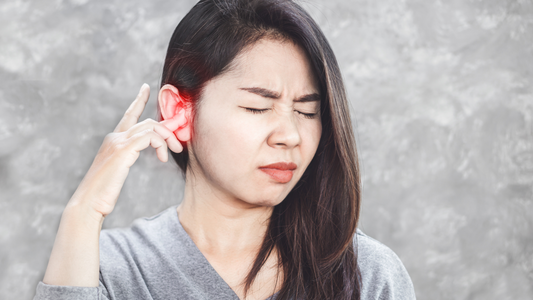Got that uninvited bell-like hum in your ears that just doesn't seem to hightail it out of there? Yep, that's tinnitus for you, and you're not in this boat alone. Loads of us golden oldies find ourselves trying to shout over that persistent ringing, and let's be honest, it can be as pesky as a mosquito at a barbecue.
In the haystack of remedies and advice, you might have come across the chat about meds. But before you get to thinking about the possibility of popping pills, grab a chair and let's sort through it over a cuppa. We're diving into whether certain meds can help dial down the tinnitus volume and what that really means for you without dragging you through a medical dictionary.
Antidepressants for Tinnitus: Weighing Benefits and Side Effects
Feeling like that ringing in your ears just won't let up? You're not alone. Many folks find that tinnitus can be a real bear to deal with every day. One road some doctors might go down is antidepressants. Now, they're not a cure-all. But for some, they offer a bit of relief when stress makes that ringing all the louder.
Talking about these meds, it's not all sunshine and roses. Some can come with side effects that you'll want to mull over. We're talking dry mouth, dizziness, and even more serious stuff for some of these pills. The tricky part? Figuring out if the trade-off is worth it for your peace and quiet.
Here's the scoop. Antidepressants like SSRIs might take the edge off for some people. But we can't say for sure they'll do the trick for everyone. It's a bit of a toss-up. If your doc suggests trying them out, it's about seeing if they help your specific tune-out of that constant ring or hum in your ears.
Quick heads-up:
- Clomipramine and the gang—we're looking at a list of usual suspects like Nortriptyline and Protriptyline.
- Talk to your doc to see if they might be worth a shot for your tinnitus.
- Keep in mind, it's a maybe, and everyone's different. What helps Joe might not help Jane.
Anti-Anxiety Medications for Tinnitus: A Peaceful Respite?

When tinnitus sends your stress levels sky-high, anti-anxiety medications might be suggested to usher in some calm. These meds, while they don't specifically target the buzz or hiss in your ears, could dial down the anxiety that amps up your tinnitus. Just like a tense day can make your head ring louder, finding a bit of tranquility can sometimes turn the volume down.
But hang on a sec, it's not all blissful silence from here. You've got to consider the possibility of hang-ups like drowsiness or even dependency with these drugs. Safety first, right? You'll want to have a heart-to-heart with your healthcare provider about whether these meds might fit your tinnitus toolkit.
Common go-tos include:
- Benzodiazepines that come with a name tag like Valium or Xanax
- Others that might not be household names but could still offer a helping hand
Remember, it's all about finding a balance – getting some relief without signing up for a bunch of unwelcome extras. So, take it step by step, and know that your path to quieter days might look different from the person next door.
The Bottom Line: Navigating Relief Strategies
When it boils down to it, living with tinnitus can be a real thorn in your side. You've heard the run-down on antidepressants and anti-anxiety meds, and it's clear there's no one-size-fits-all answer. Remember, these drugs aren't buzzing on the market as tinnitus-specific solutions, but they could lend a hand in managing those relentless, ringing overtures.
Here’s a reality check – always hit up your healthcare pro before you start tuning up your treatment playlist. They'll cue up the insights on what might mesh with your rhythm and keep you in the loop about the pros and cons.
Just a couple of takeaways:
- Antidepressants and anti-anxiety meds may ease the tinnitus turmoil for some, not all.
- The benefits could be music to your ears or just another noise in the crowd.
- Personalized care is the name of the tune here. You need a tailored track to harmonize with your health.
No magic pill's dropping to silence that sound, but with a bit of trial, error, and expert advice, you might just find your way to a more serene soundscape. So, keep a dialogue drumming with your doc and maybe, just maybe, you'll hit a note that softens the pitch.
Finding Tune-Out Tactics for Tinnitus
Let's face it, no one's dancing to the tune of tinnitus, and when it comes to relief, the path isn't lined with neon signs. Antidepressants and anti-anxiety meds might have their spot on the shelf, but it's not a one-hit wonder for all. You're the DJ here, and it's about mixing the right tracks to muffle that inner buzz.
Check in with your healthcare provider to navigate your options - they're your backstage pass to understanding the ups and downs of each potential remedy. We've all got different beats to walk to, and finding that milder melody for your tinnitus is about personalizing your playlist. Keep the lines open with your doc, and who knows, you might just find a bit of harmony amidst the noise.
Sources & References
- Baldo, P., Doree, C., Molin, P., McFerran, D., & Cecco, S. (2012). Antidepressants for patients with tinnitus. Cochrane Database of Systematic Reviews, (9). https://www.ncbi.nlm.nih.gov/pmc/articles/PMC7156891/
- Folmer, R. L., Theodoroff, S. M., Martin, W. H., & Shi, Y. (2014). Experimental, controversial, and futuristic treatments for chronic tinnitus. Journal of the American Academy of Audiology, 25(1), 106-125. https://www.ncbi.nlm.nih.gov/pmc/articles/PMC4895692/
- Salvi, R., Lobarinas, E., & Sun, W. (2009). Pharmacological treatments for tinnitus: new and old. Drugs of the Future, 34(5), 381-400. https://www.ncbi.nlm.nih.gov/pmc/articles/PMC2729192/
- Drollinger, T., Comer, L. B., & Warrington, P. T. (2006). Development and validation of the active empathetic listening scale. Psychology & Marketing, 23(2), 161-180. https://doi.org/10.1002/mar.20105
- Perreault, L. (2019). Obesity in adults: Role of physical activity and exercise. UpToDate. https://www.uptodate.com/contents/obesity-in-adults-role-of-physical-activity-and-exercise

The Hear Well Group Research Team: Trusted Hearing Health Insights
Our experienced research team compiles hearing health data from credible, peer-reviewed sources and presents it in easy-to-understand terminology. We ensure accuracy and trustworthiness, providing up-to-date, evidence-based recommendations to enhance hearing care practices and inform our readers' hearing well-being decisions.


